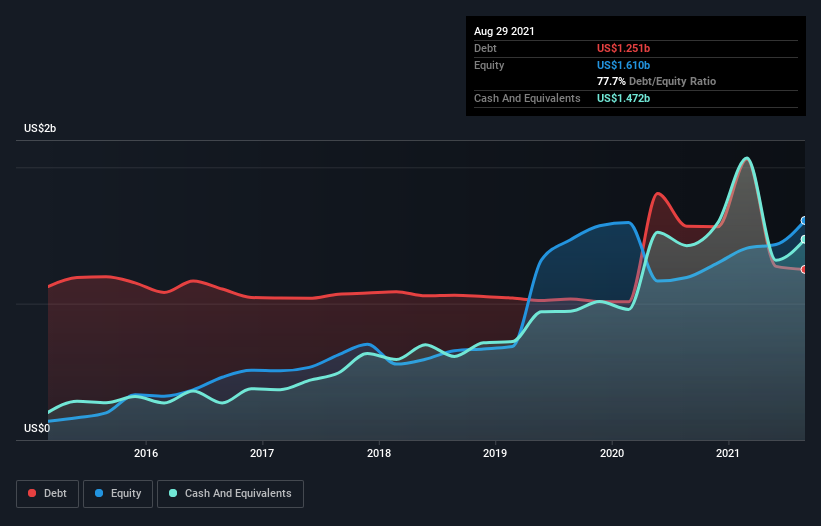Levi Strauss (NYSE:LEVI) Has A Rock Solid Balance Sheet
Howard Marks put it nicely when he said that, rather than worrying about share price volatility, 'The possibility of permanent loss is the risk I worry about... and every practical investor I know worries about.' It's only natural to consider a company's balance sheet when you examine how risky it is, since debt is often involved when a business collapses. As with many other companies Levi Strauss & Co. (NYSE:LEVI) makes use of debt. But should shareholders be worried about its use of debt?
When Is Debt A Problem?
Debt assists a business until the business has trouble paying it off, either with new capital or with free cash flow. If things get really bad, the lenders can take control of the business. However, a more usual (but still expensive) situation is where a company must dilute shareholders at a cheap share price simply to get debt under control. Of course, plenty of companies use debt to fund growth, without any negative consequences. The first step when considering a company's debt levels is to consider its cash and debt together.
View our latest analysis for Levi Strauss
What Is Levi Strauss's Debt?
You can click the graphic below for the historical numbers, but it shows that Levi Strauss had US$1.25b of debt in August 2021, down from US$1.57b, one year before. But it also has US$1.47b in cash to offset that, meaning it has US$221.3m net cash.
A Look At Levi Strauss' Liabilities
The latest balance sheet data shows that Levi Strauss had liabilities of US$1.77b due within a year, and liabilities of US$2.61b falling due after that. Offsetting these obligations, it had cash of US$1.47b as well as receivables valued at US$667.3m due within 12 months. So its liabilities outweigh the sum of its cash and (near-term) receivables by US$2.24b.
Levi Strauss has a market capitalization of US$9.90b, so it could very likely raise cash to ameliorate its balance sheet, if the need arose. However, it is still worthwhile taking a close look at its ability to pay off debt. While it does have liabilities worth noting, Levi Strauss also has more cash than debt, so we're pretty confident it can manage its debt safely.
Better yet, Levi Strauss grew its EBIT by 249% last year, which is an impressive improvement. That boost will make it even easier to pay down debt going forward. There's no doubt that we learn most about debt from the balance sheet. But it is future earnings, more than anything, that will determine Levi Strauss's ability to maintain a healthy balance sheet going forward. So if you want to see what the professionals think, you might find this free report on analyst profit forecasts to be interesting.
But our final consideration is also important, because a company cannot pay debt with paper profits; it needs cold hard cash. While Levi Strauss has net cash on its balance sheet, it's still worth taking a look at its ability to convert earnings before interest and tax (EBIT) to free cash flow, to help us understand how quickly it is building (or eroding) that cash balance. Over the last three years, Levi Strauss recorded free cash flow worth a fulsome 85% of its EBIT, which is stronger than we'd usually expect. That puts it in a very strong position to pay down debt.
Summing up
Although Levi Strauss's balance sheet isn't particularly strong, due to the total liabilities, it is clearly positive to see that it has net cash of US$221.3m. The cherry on top was that in converted 85% of that EBIT to free cash flow, bringing in US$578m. So we don't think Levi Strauss's use of debt is risky. We'd be very excited to see if Levi Strauss insiders have been snapping up shares. If you are too, then click on this link right now to take a (free) peek at our list of reported insider transactions.
Of course, if you're the type of investor who prefers buying stocks without the burden of debt, then don't hesitate to discover our exclusive list of net cash growth stocks, today.
Have feedback on this article? Concerned about the content? Get in touch with us directly. Alternatively, email editorial-team (at) simplywallst.com.
This article by Simply Wall St is general in nature. We provide commentary based on historical data and analyst forecasts only using an unbiased methodology and our articles are not intended to be financial advice. It does not constitute a recommendation to buy or sell any stock, and does not take account of your objectives, or your financial situation. We aim to bring you long-term focused analysis driven by fundamental data. Note that our analysis may not factor in the latest price-sensitive company announcements or qualitative material. Simply Wall St has no position in any stocks mentioned.

